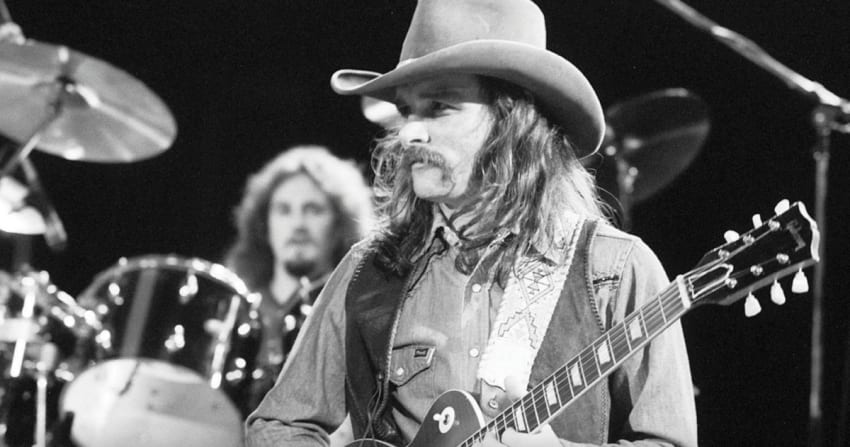The Allman Brothers Band Guitarist Dickey Betts Has Died
The co-founding member of the legendary southern rock band was 80.
By Team JamBase Apr 18, 2024 • 9:01 am PDT

The Allman Brothers Band guitarist, singer and songwriter Dickey Betts died today (Thursday, April 18) at age 80 due to cancer and chronic obstructive pulmonary disease Betts’ manager David Spero confirmed to Rolling Stone. A statement issued by Dickey Betts’ family confirming the Rock & Roll Hall of Famer’s death reads:
“It is with profound sadness and heavy hearts that the Betts family announce the peaceful passing of Forrest Richard ‘Dickey’ Betts (December 12, 1943 – April 18, 2024) at the age of 80 years old. The legendary performer, songwriter, bandleader and family patriarch was at his home in Osprey, Florida, surrounded by his family. Dickey was larger than life, and his loss will be felt worldwide. At this difficult time, the family asks for prayers and respect for their privacy in the coming days. More information will be forthcoming at the appropriate time.”
Born Forrest Richard Betts on December 12, 1943, in West Palm Beach, Florida, Betts grew up in a musical family and developed an interest in playing guitar at a young age. He honed his skills by listening to blues and jazz records.
In the late 1960s, Betts formed the band Second Coming with future Allman Brothers Band bassist Berry Oakley, which gained some local recognition but ultimately disbanded.
A serendipitous jam session in 1969 with local musicians Duane Allman and Gregg Allman led to the founding of The Allman Brothers Band. Betts quickly became a vital contributor to the band’s signature Southern rock sound, blending elements of blues, R&B and jazz.
The original ABB lineup featured Gregg, Duane, Betts, Oakley and drummers Butch Trucks and Jaimoe. Betts recalled everyone but Duane wanting Gregg to join their fledgling project.
“Yeah, Duane and his brother were having an argument and Duane didn’t want Gregg,” Betts told Wade Tatangelo of the Sarasota Herald Tribune in 2019. “We had five of us, and Duane was singing and there was me singing and Berry Oakley singing but we were guitar players; we weren’t really singers. We knew Gregg and we kept trying to get Duane to call him.
“We finally talked Duane into calling Gregg one night and when he came down I think we were in the middle of ‘Don’t Want You No More,’ the instrumental version we did of the Spencer Davis Group song. Gregg walked in on that and he was saying, ‘God, what a band!’ He was just really blown away, which made us all proud. We were real glad to see Gregg.”
The group took the stage within a few days; moved to Macon, Georgia; signed with Capricorn Records and put out their self-titled debut studio album by the end of 1969.
The group toured relentlessly in 1970 and released Idlewild South, a studio album that contained such gems as the Betts-written “Revival” and “In Memory Of Elizabeth Reed” and their hit “Midnight Rider.” While the first two albums weren’t commercially successful upon their release, the group became known for their outstanding live performances, fittingly breaking through with their landmark 1971 live album, At Fillmore East.
Betts was responsible for writing many of The Allman Brothers Band’s most well-known and commercially successful hits, including “Blue Sky,” “Ramblin’ Man” and the Grammy Award-winning instrumental “Jessica.” Betts composed the aforementioned instrumental jam vehicle “In Memory Of Elizabeth Reed” and “Revival,” plus other ABB favorites like “Southbound.” His contributions were crucial to the band’s success, particularly on subsequent albums like Eat a Peach and Brothers And Sisters.
After the tragic deaths of Duane Allman and Berry Oakley in separate accidents in the early 1970s, Betts and the ABB played through their grief. Betts assumed a more prominent role in the band, leaving an indelible mark with his composition and vocals on the group’s anthem, “Ramblin’ Man.”
Prior to The Allman Brothers Band’s hiatus in 1976, Betts ventured into solo endeavors, releasing his debut solo album Highway Call in 1974. Despite reunions and splits within the ABB, Betts maintained his musical journey with projects like the Dickey Betts Band and Dickey Betts & Great Southern, continuing to captivate audiences with his signature guitar stylings and recognizable vocals.
In 1989, The Allman Brothers Band reformed, with Betts contributing to the band’s resurgence alongside guitarist Warren Haynes. Their symbiotic chemistry reignited the ABB’s flame, which at the time saw them earning accolades such as induction into the Rock And Roll Hall Of Fame.
Remaining through many lineup changes, Betts’ tenure with The Allman Brothers Band was marked by creative highs and interpersonal challenges. He eventually left the band in 2000 amid disagreements with other members.
Outside of his work with The Allman Brothers Band, Betts continued to pursue a solo career and collaborated with many other musicians. He released several albums under his name and continued to perform live, showcasing his enduring talent and musical versatility.
In 2018, Betts survived a mild stroke and months later underwent successful brain surgery after an accidental fall.
In December 2023, Dickey Betts celebrated his 80th birthday by attending the The Allman Betts Family Revival concert at Van Wezel Performing Arts Center in Sarasota, Florida to watch The Allman Betts Band and guests perform a number of songs from The Allman Brothers Band live repertoire, including many he wrote. The Allman Betts Band is led by Dickey’s son, Duane Betts, and Devon Allman, the son of fellow ABB co-founder Gregg Allman.
Throughout his career, Dickey Betts faced personal struggles, including battles with addiction and legal issues. Despite these challenges, his contributions to the world of rock music are widely recognized and celebrated. Betts’ distinctive guitar style and songwriting helped define the Southern rock genre.
